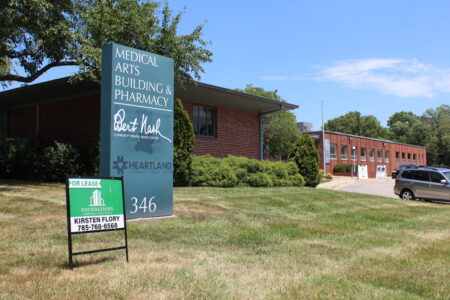Community Children’s Center will help child care providers streamline administrative services as northeast Kansas hub agency for new Shared Services Network

photo by: Austin Hornbostel/Journal-World
The Community Children's Center's Early Childhood Community Center will eventually be located at 346 Maine St., currently the Medical Arts Building & Pharmacy.
The Community Children’s Center is already a leader in early-childhood care in Douglas County, and a new regional network for child-care providers will give the nonprofit a chance to make an impact on an even broader scale.
Gov. Laura Kelly’s office announced earlier this week that the Community Children’s Center was one of five organizations selected to serve as lead providers for the state’s new Shared Services Networks. The five networks are divided by geographical area, with the Community Children’s Center serving as the “network hub” for northeast Kansas.
The nonprofit will help to streamline administrative services for participating child care programs in 16 counties: Chase, Morris, Geary, Riley, Pottawatomie, Marshall, Nemeha, Brown, Doniphan, Jackson, Jefferson, Douglas, Shawnee, Wabaunsee, Lyon and Osage. Kim Polson, the Community Children’s Center’s executive director, said it’s a role that tells the agency it’s on the right path — and leading the way, to boot.
“The regional aspect is significant,” Polson told the Journal-World Friday. “This is not just for Douglas County. We had intended to do this anyway, so this is a grant for what we intended to do on a Douglas County level, but now we’re in a position where we can extend that reach even further and support the northeast region.”
Thanks to that role, the Community Children’s Center has received a 12-month $250,000 grant that funds a number of expenses related to the Shared Services Network, including the salaries for two new positions. One of them, a shared services program manager, will start working with the nonprofit at the start of October.
Polson said the grant’s budget also includes funding to help providers cover the cost of legal services, plus stipends to support liaisons based in each of the other 15 northeast region counties.
“…We’d really like to have everybody walk away with something,” Polson said. “This grant ends June 30, so it’s already been underway, and it’s taken a few months to ramp up and for regions to get individuals hired into positions to support it.”
Determining what areas providers could use the most support with was something the Community Children’s Center was already starting to do in Douglas County, Polson said. The agency had already sent out a survey to county providers asking about their greatest administrative needs, and it was able to issue the same survey to the greater 16-county region after being named a Shared Services Network hub.
The survey, which ultimately polled 79 providers throughout the area, found that their biggest needs were in areas like health insurance, the substitute pool, classroom materials, professional development and food purchasing. The grant also covers areas like translation services to help providers be better prepared to work with Spanish-speaking families.
Bolstering the substitute pool is one example of how the Shared Services Network is intended to work, Polson said. Unlike the public school system, some independent providers — especially those run by a single individual or located in rural areas — can be forced to close entirely if enough staff members are absent.
That’s an issue for northeastern Kansas providers. The regional survey found that 60% of respondents had been forced to close a classroom or their whole facility at least once in the past year due to the absence of one or more regular staff members. Some even had to close five or more times.
“When child-care facilities shut down, it affects everybody,” Polson said. “Not just the child, not just the teachers, but (also) parents who now have to navigate who stays home, who doesn’t. …(It’s) one of the key shared services that helps the entire system, because it’s supporting not only providers, but it’s supporting parents who need to be at work, and it reduces gaps in care which are not ideal.”
The idea is to take county-specific solutions and scale them to entire regions, Polson said — and possibly even the entire state. For this particular challenge, there are already agencies like Customized Early Education working to recruit substitute child-care staffers for several counties in the state, and Polson said the agency is working to recruit subs for the northeastern Kansas region as well.
On a statewide level, the five Shared Services Networks are already meeting and working together to determine how they can cumulatively leverage resources beyond just the bounds of the regions they’re serving. Polson said that could include pinpointing one statewide vendor for providers’ retirement benefits, substitute pools and janitorial supplies.
It all plays into the Community Children’s Center’s “three-pronged model” to support early-childhood care in the community, director of communications and development Will Averill said, with one of those prongs focused on providing professional support to child-care providers.
“Basically, anything that we could look at to take administrative and business work off the shoulders of the providers, to help them to do what they need to do, which is to focus on that early childhood care,” Averill said.







